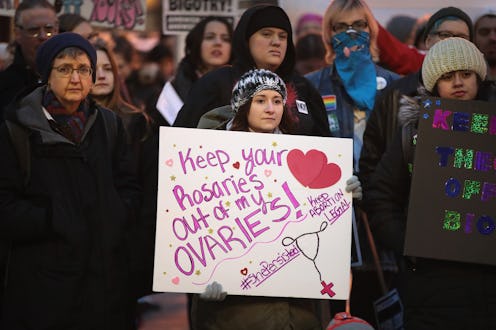News
This Is When Companies Can Legally Start Denying You Birth Control Coverage

Friday is a dark day for proponents of women's reproductive rights and contraception access. That's because the Trump administration, specifically the Department of Health and Human Services, has announced an end to the Affordable Care Act's contraception mandate, meaning employers will no longer be forced to cover birth control in their employee health insurance plans if they have a religious objection. And if you're wondering when Trump's birth control mandate reversal will take effect, the answer is right now.
That's right, as startling as it may sound. While most major policy changes like these have some kind of implementation window, to ease the transition as well as allow time for public comment and reaction, this change will reportedly be effective immediately.
What this means, in simple and real terms, is that if you're a woman who gets contraception through your employer-based health insurance plan, your company can now theoretically strip that coverage from you, and force you to buy birth control out of pocket. According to NPR, HHS Office of Civil Rights Director Roger Severino, defended the policy change as "limited," and a way for companies to "live out their religious identity":
This provides an exemption, and it's a limited one. We should have space for organizations to live out their religious identity and not face discrimination.
The decision makes good on a promise Trump made to the Roman Catholic women's organization Little Sisters of the Poor, a group that sued the Obama administration over the mandate. Back in May, Trump assured the Little Sisters of the Poor that the contraception mandate would be undone. Said Trump:
Under my administration, free speech does not end at the steps of a cathedral or a synagogue or any other house of worship. We are giving our churches their voices back and we are giving them back in the highest form. With this executive order, we also make clear that the federal government will never, ever penalize any person for their protected religious beliefs. That is why I am today directing the Department of Justice to develop new rules to ensure these religious protections are afforded to all Americans.
The upshot of this news is that companies can now get out of having to provide contraceptive coverage to the women who work for them by citing a religious objection, which critics are identifying as an absolutely massive loophole.
Previously, thanks to the Supreme Court's ruling in the Burwell v. Hobby Lobby case back in 2014, closely-held companies whose owners had religious objections to covering birth control were exempted from the mandate, but the Trump administration's rule change is opening that avenue up to all employers, corporate or nonprofit, regardless of their size.
Needless to say, this is a tremendously perilous situation for women who depend on their employer-based health coverage to control their own reproduction. While the administration has claimed that very few women will be affected by this change ― senior officials told reporters that "99.9 percent of women" would not be impacted ― the fact remains that offering companies a way to save money by shifting the burden of paying for contraceptives onto their workers provides them an incentive to do so.
Nobody in the administration has given any indication how it arrived at that 99.9 percent figure. In reality, basically every employer in America that must provide health insurance to its employees ― companies that employ full-time workers at more than 30 hours per week, in other words ― now has a way to try to duck those costs, if they so desire. And given that corporations in a capitalist system are essentially entirely driven by making profits, hoping that most of them simply choose not to take advantage of that may not be a safe bet.